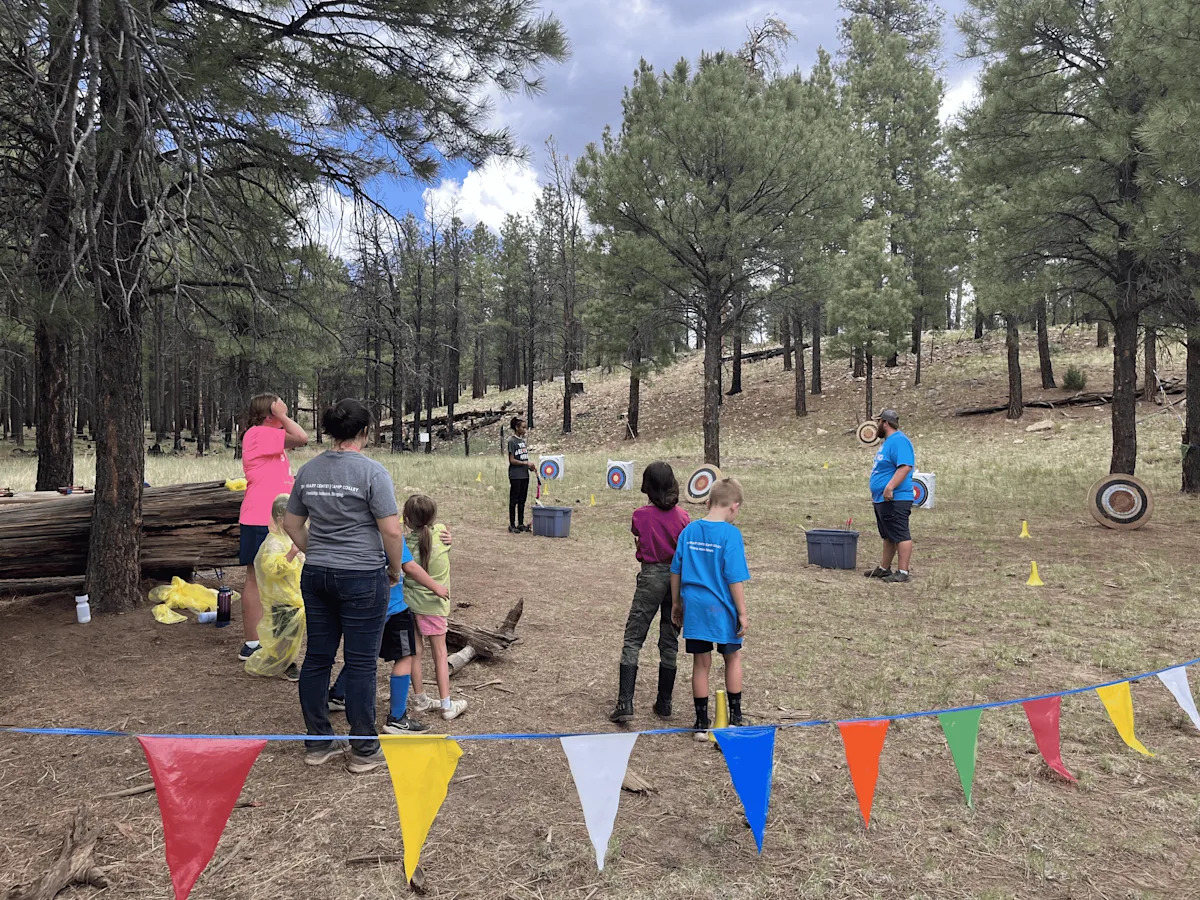A Phoenix program for kids to escape the city’s summer heat and get outdoors returned for a second year after its most recent hiatus.
Camp Colley, the city of Phoenix’s summer camp, has endured financial challenges over its more than two decades, in part by adapting its programming to meet demands. The camp’s latest iteration puts a focus on children with disabilities.
The camp is in a remote area north of Payson and sits on a flat expanse of land hidden behind dense forests. It was started by former Phoenix Parks and Recreation Director James A. Colley.
Colley dedicated his career to increasing Parks and Recreation Department programming and making sure kids of all backgrounds could enjoy them, according to the American Academy for Park and Recreation Administration. With Camp Colley, he wanted to provide children from underserved populations in the Valley with the benefits of outdoor recreation, said Chelsea Harden, founder and executive director of the Harden Education and Recreation Therapy Foundation, also known as the H.E.A.R.T. Center.
In 2023, the H.E.A.R.T. Center, a nonprofit microschool operator and provider of equestrian recreational therapy to disabled and neurodivergent youth, took over operations for Camp Colley. The H.E.A.R.T. Center brought its expertise in inclusive learning environments to Camp Colley and refined the program’s commitment to serving underserved populations, Harden said.
“We know wholeheartedly what the mission of this place is, what it stands for, why it exists,” said Harden. “It is really important that we make sure that camp is cost-effective and that cost is not a barrier for people to attend.”
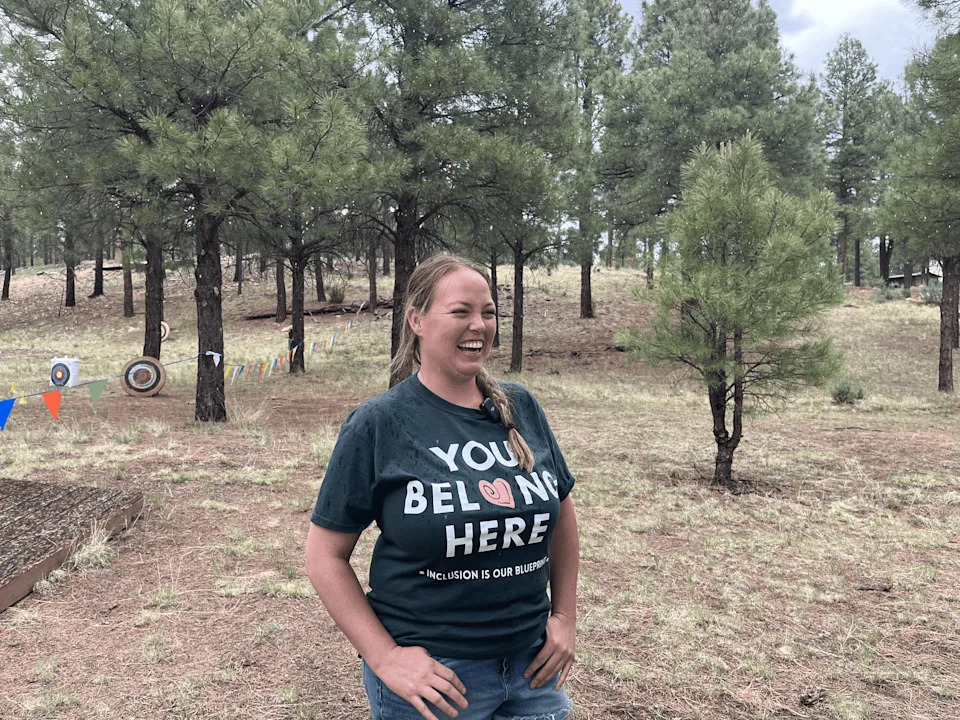
Chelsea Harden, founder and executive director of the Harden Education and Recreation Therapy Foundation, also known as the H.E.A.R.T. Center., helped bring back Camp Colley, Phoenix’s summer camp program in the pines. Harden in Coconino County on July 8, 2025.
The partnership between Phoenix and the H.E.A.R.T. Center is just one instance of the camp’s long history of collaborating with local organizations to keep Camp Colley running for over two decades, said Claire Miller, park supervisor for Phoenix.
“You can bring a lot of information and stuff to the kids down in the community centers, but there’s nothing like having this kind of an experiential opportunity to really be in the pines,” said Miller.
Camp Colley is for kids 7 to 15 who are Phoenix residents or have a parent with a Phoenix Parks and Recreation account, as well as students of the H.E.A.R.T. Center, said Harden. The camp runs from mid-June to late July, and fees range from $175 for a three-day camp to $275 for a five-day camp, according to the camp’s website. Camp Colley also offers leadership roles for kids who are 16 and 17, with fees from $100 for a three-day camp to $150 for a five-day camp. Young adults with disabilities ages 18 to 22 can also take on leadership roles at no expense, according to the website.
Fees include transportation from Phoenix to the campgrounds, meals and lodging. Phoenix also provides scholarships so kids can attend at no cost to families, said Harden.
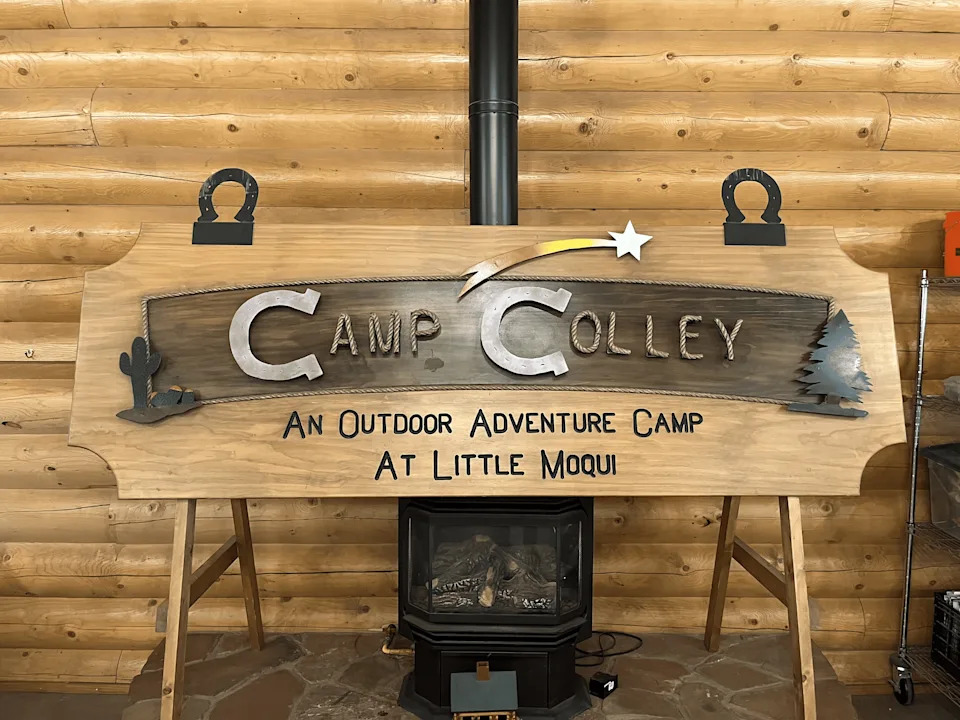
Phoenix’s Camp Colley in Coconino County, Arizona, on July 8, 2025.
Despite a financial crisis and a global pandemic, Camp Colley lives on
Phoenix bought the land that would be used for Camp Colley for $1.38 million in 2001 and opened its campgrounds for remote camping the following year, according to a 2019 report from the Phoenix Parks and Recreation Department. Throughout the 2000s, Phoenix expanded the camp’s facilities to include stables for an equestrian program, solar panels for off-grid power and a bathhouse for hot showers, the report said.
In 2008, as a result of the Great Recession, the Parks and Recreation Department saw staff reductions and budget cuts that put the camp at risk of being discontinued, said Miller. That’s when the Camp Colley Foundation, a nonprofit established in 2005 to help raise funds for lower-income youth to attend summer camp, took over camp operations, she said.
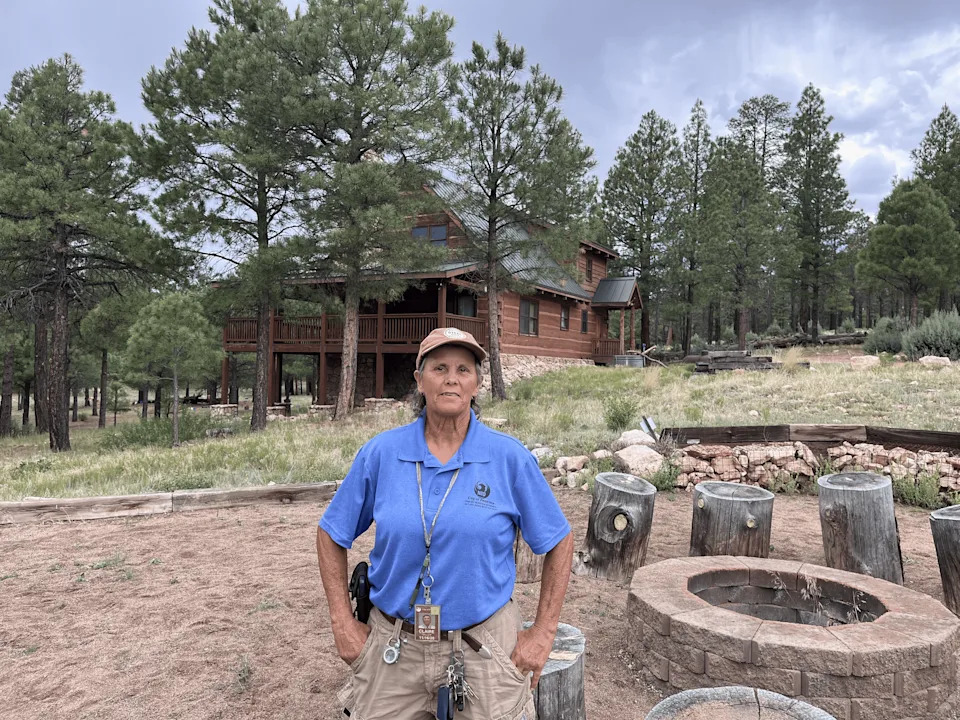
Claire Miller, at Camp Colley in Coconino County on July 8, 2025, has worked for Phoenix’s Parks and Recreation Department since 1986.
“When we lost those positions, we lost the ability to have city staff running the camp,” said Miller, who joined Phoenix’s Parks and Recreation Department in 1986. “It’s not cheap to maintain a facility like this; this facility is also very unusual because it’s completely off-grid, so it just adds another layer of challenge.”
In 2012, the Arizona Parks and Recreation Fellowship, an organization that awards grants and scholarships, took over operations, according to the Parks and Recreation Department report. The following year, Camp Colley had to close for the summer due to a Coconino County permit noncompliance issue, the report said. In 2017, the Arizona Parks and Recreation Fellowship ended its relationship with Camp Colley, resulting in another lost year for the summer camp, according to the report.
Tonto Creek Camp took over operations for two years beginning in 2018 before handing it off to Camp Colley Foundation again in 2020, the report said. The program was closed in 2020 because of COVID-19 and in 2021 because of wildfires.
For the next two years, Camp Colley had no operator. Then, the H.E.A.R.T. Center decided to step up to the challenge. Harden, who was a counselor at Camp Colley from 2008 to 2014 and ran the equestrian program, said she knew that the H.E.A.R.T. Center could bring the camp back with a greater focus on recreational therapy.
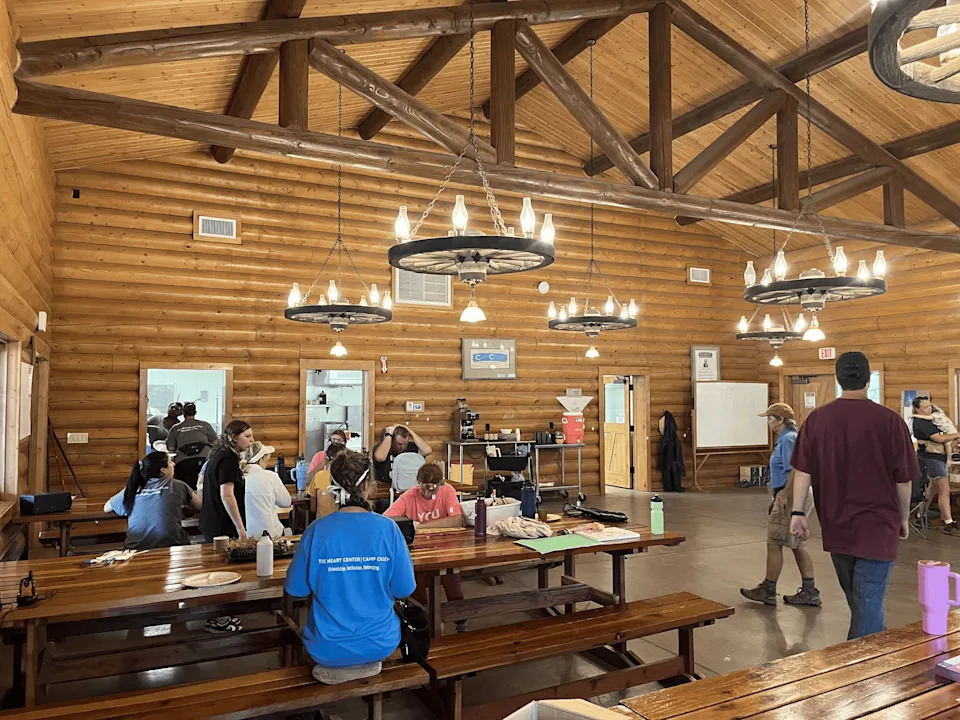
Campers have lunch in Camp Colley’s dining hall. Photo taken in Coconino County, Arizona, on July 8, 2025.
“Being a camp counselor and somebody who ran those programs, I got to see firsthand the impact that being able to take a group of kids to the forest could have on their lives,” Harden said.
How H.E.A.R.T. Center expanded upon Camp Colley’s existing framework
Harden became a certified recreational therapist and opened the H.E.A.R.T. Center in 2014 to provide therapeutic horsemanship to help students with developmental disabilities build confidence.
“By having recreation therapists on staff, we’re able to adapt the activity to support the physical-cognitive needs of all the students that attend camp,” said Harden.
Campers spend three to five days at Camp Colley, from Tuesday through Thursday or Monday through Friday, depending on the program for which they signed up. Days start at 7 a.m. when the campers wake up and go until 9 p.m. when the lights in the cabin go out, Harden said. Throughout the day, campers participate in activities including horse care, crawdad fishing in the nearby creek and hiking, said Harden.
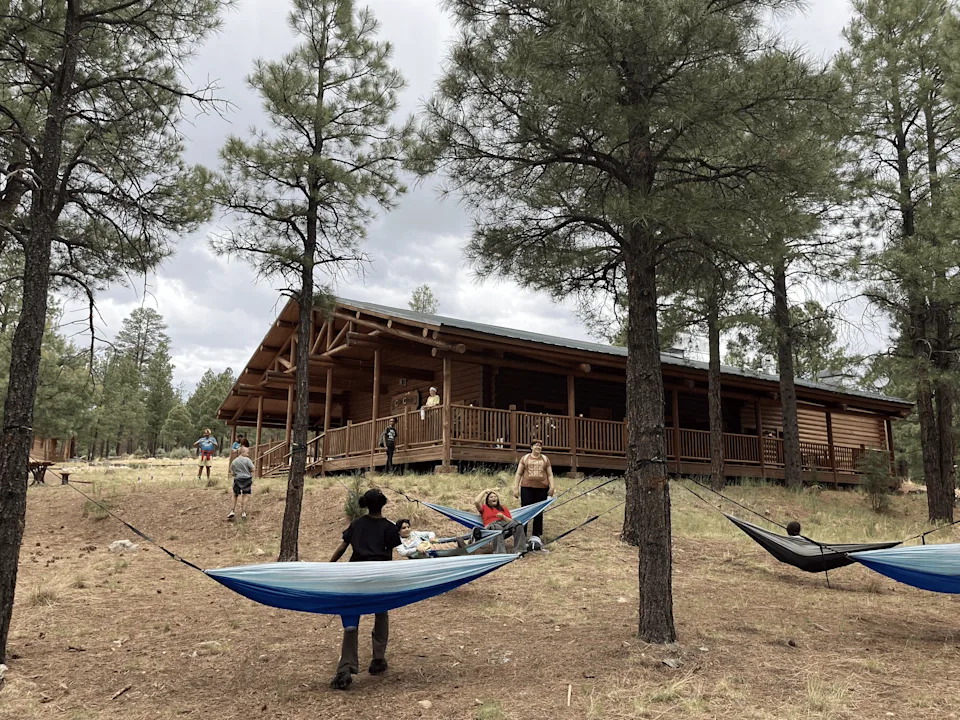
Campers in hammocks at Phoenix’s Camp Colley in Coconino County on July 8, 2025.
Activities at Camp Colley are meant to encourage social and emotional learning, Harden said. Group games aim to teach campers communication and teamwork skills, and other activities, like archery, allow them to practice hand-eye coordination. Activities allow campers to identify positive attributes about each other and help them make friends in a way that is less daunting for neurodivergent kids, said Harden.
On a recent July day, campers experienced a cool, rainy afternoon while 100 miles away, Phoenix was expected to have record high temperatures. Campers were given disposable raincoats to shield themselves during outdoor activities. One group of 6- to 7-year-olds, practicing teamwork, used their raincoats to build a fort.
Out of all the activities at Camp Colley, the equestrian instruction seemed to be the most popular, according to the horse riding instructor for H.E.A.R.T. Center, Alex Halping.
“The biggest thing with these animals is that they’re incredible at mirroring and regulating emotions,” which is helpful for campers with neurodivergency who have big emotions, said Halpin. “The horses get them, and they get the horses in a way that I can’t explain.”
Neurodivergent campers learn better in mixed-ability environments, where neurodivergent and disabled students are taught alongside neurotypical students, Harden said.
“Kids that wouldn’t be able to integrate into a larger camp, they are able to integrate into ours because we are able to keep smaller group sizes, and we have specialized teams,” said Harden.
Teens and young adults can return to summer camp as Camp Colley staff
As campers get older, they can continue attending Camp Colley by taking on leadership roles under the guidance of camp counselors they’ve developed relationships with over the years, Harden said.
Campers in leadership roles earn work experience while participating in camp activities, which helps them build their resumes, said Miller. They also learn how to be camp counselors so they can return to Camp Colley as an instructor or have a similar role at another summer camp, she said.
Young adults with disabilities can also return to camp while learning essential work skills in a safe environment, said Miller. These campers can obtain their Food Handler’s Certificate so that they can help around the kitchen with meal preparation and serving, in addition to taking on other critical work, said Miller.
Employing young adults has helped Camp Colley with staffing issues that have been a problem in the past, Miller said.
“It is so great to see it up and running,” and have kids experience the benefits of being out in nature, she said.
Coverage of education solutions on azcentral.com and in The Arizona Republic is partially supported by a grant from the Arizona Local News Foundation’s Arizona Community Collaborative Fund.
This article originally appeared on Arizona Republic: Phoenix camp in Coconino County has endured for decades. Here’s how
